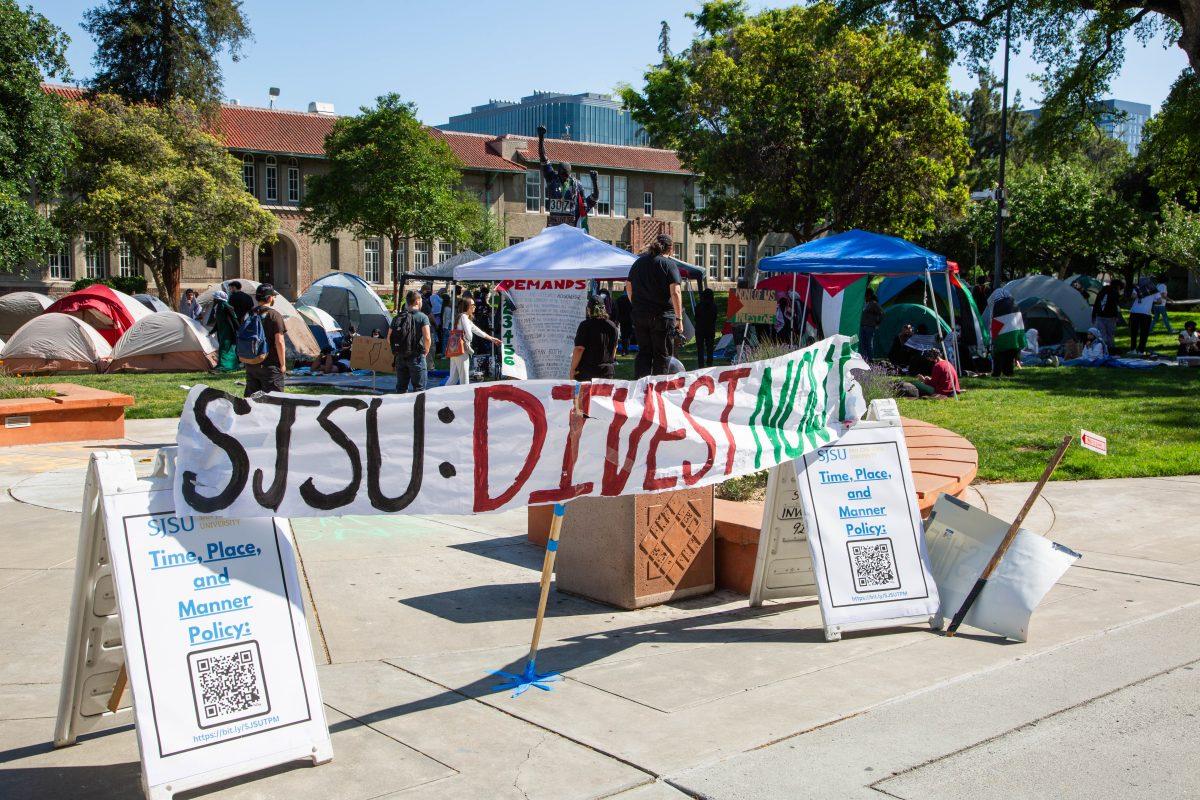
California State University’s Interim Free Expression and Time, Place and Manner policy went into affect for all 23 campuses on Aug. 16.
Prohibited activities outlined in the systemwide policy include setting up encampments, unauthorized occupation of buildings and concealment of identity on CSU campuses, according to the Interim Systemwide Time, Place and Manner Policy page.
As the new semester settles in, faculty and students have voiced issues with the implementation of these protocols and possible attacks on their freedom of speech.
Sang Hea Kil, a member of the Caucus of Rank-and-file Education Workers within the California Faculty Association, has been vocal about her opposition to the Time, Place and Manner policy.
“I think it should be called — more appropriately — the Totalitarian Power Memo,” Kil said. “Because what it does (is) it erodes our constitutional rights, particularly the First Amendment right.”
Business analytics sophomore Zoie King said she also feels the Time, Place and Manner policy is repressive to the campus community.
“Putting these policies in place — to students — is shutting our voices down, is not listening to what we have to say (and) is not listening to the importance of these movements,” King said.
King said the new policy is a clear response to pro-Palestinian protests that took place across multiple CSU campuses in the previous academic year.
“I think it’s really from the Free Palestine movement,” she said. “I think having students recording on campus, having students (practice) free speech and protesting on campus just wasn’t a good look on the school, to be honest.”
Kil was involved in pro-Palestinian protests on SJSU’s campus in the 2023-2024 academic year before being temporarily suspended as a professor in the Justice Studies Department on May 24, 2024, according to May 27 article by NBC Bay Area.
“I think the intent of these revised Time, Place, Manner policies is to send a chilling message to all campus community, faculty, staff, students and community members that they will be suppressed in their free speech around political activism,” Kil said.
Associated Students Board of Directors released a statement on Thursday in an Instagram post signed by A.S. President Ariana Lacson stating SJSU’s student government will advocate for students and is very interested in hearing different perspectives from the student body.
Associated Students has not yet put forward an official stance for or against the Time, Place and Manner policy.
“We’re really just waiting to see what students have to say before we ourselves take a stance because we really are supposed to be representative of the student body,” Lacson said.
Lacson brought up concerns about the enforcement of the directive against face coverings, citing an absence of exceptions for religious reasons as it relates to Muslim students.
“I have regular meetings scheduled with President (Cynthia) Teniente-Matson, and the Vice President of Student Affairs, Mari (Fuentes-Martin),” Lacson said. “I’m hoping to bring this concern and kind of discuss a little bit more with them (on) what this would entail regarding the concealment of identity portion.”
Section F of the CSU policy prohibits the use of face coverings when used for “intimidating” others or evading identification from university officials, according to the policy page.
“It really is about do we have administrators and campus cops that are trained to the level that they won’t apply these policies in an ableist or Islamophobic way?” Kil asked.
Lacson said she hopes students communicate their grievances and feedback to A.S. through their public board meetings, town halls and anonymous feedback forms.
“Once we’re actually able to meet with constituents and say, ‘OK, we have 10 students who said that XYZ is an issue,’ ” Lacson said. “Then in those meetings where I do meet with administrators and our other directors meet with their liaisons, they’re able to bring those issues forward.”
King said the university should make a larger effort to listen to the student activist community rather than squash their voices with infringing policies.
“Listen to your students, hear the concerns that students are expressing about this policy instead of just emailing us these things — these blank, empty statements,” King said.